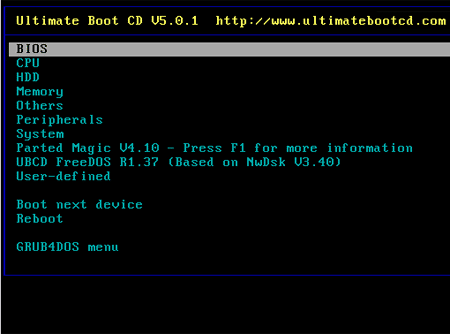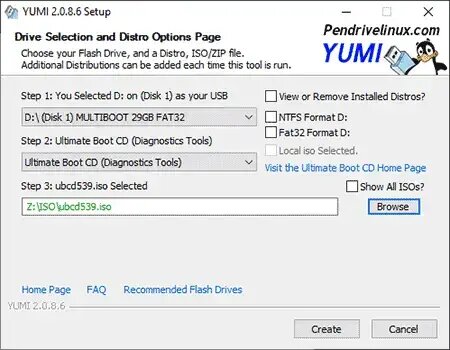Easily create an Ultimate Boot CD (UBCD) bootable USB flash drive from Windows using YUMI, dd for Windows or dd from Linux. UBCD is a widely used computer diagnostics tool that consolidates over 100 essential system diagnostics and hardware troubleshooting utilities into a single ISO file.
Ultimate Boot CD Running from a Bootable USB
Below is a screenshot of the Ultimate Boot CD running from a bootable USB drive.

The Ultimate Boot CD (UBCD) is a collection of diagnostic and system recovery tools compiled into a bootable disc. The project was originally initiated and developed by Victor Chew, and the first version 1.0, was released on June 24, 2003. The project has since seen several updates and contributions from individuals within the open source community who are constantly collaborating to provide improvements to the software.
It is designed to be a comprehensive toolset for troubleshooting and repairing computer systems. It includes a wide range of utilities for tasks such as system analysis, hardware testing, partitioning, data recovery, and more. The project has been valuable for both IT professionals and home users in diagnosing and resolving issues with computer systems.
Included are popular utilities such as BIOS and CPU tools, memory testers, data backup and recovery software, diagnostic tools and more. Each tool can be quickly launched from the UBCD Menu, further eliminating a need for separate installs of each included tool. Here's a granular breakdown of the features of these software utilities and tools:
- System Information and Analysis: Tools for CPU, memory testing, and hardware component examination.
- Disk and File System Tools: Hard disk diagnostics, partition management, and data recovery utilities.
- Hardware Testing and Benchmarking: Tools for testing and benchmarking various hardware components.
- Backup and Recovery Software: Backup and imaging tools, along with file recovery utilities.
- Network and Internet Tools: Network analysis, connectivity testing, and troubleshooting utilities.
- Antivirus Scanners and Password Recovery: Tools for malware detection and removal, as well as password recovery.
- System Maintenance Utilities: Boot management, registry editing, and system diagnostic programs.
- Operating System Repair: Boot loaders, managers, and utilities for OS repair and recovery.
- Memory Testing: Tools for identifying errors in system memory.
- Peripheral Testing: Utilities for diagnosing issues with peripherals such as printers and USB devices.
UBCD Specifications
- Home Page: Project Page
- Lead Developer: Victor Chew
- First Release: 2003
- Persistence: Not necessary
Ultimate Boot Disk USB Creation Essentials
- YUMI (for USB flash drive conversion)
- UBCD ISO file
- USB flash drive (a fast USB drive is preferred)
- A Windows PC (or Linux with WINE) for creating the bootable USB
How to Create an Ultimate Boot CD Bootable USB
There are several ways to create a bootable USB from an ISO file. Below, we outline the step-by-step process for two popular methods. The first method uses the YUMI Multiboot tool, which allows you to store multiple ISO files on the same USB drive while still using it for regular storage. The second and third methods use DD for Windows or the Linux DD command, which writes the ISO file directly to the USB drive, making it function like a bootable CD.
Method 1: Using YUMI
To create an Ultimate Boot CD Bootable USB using YUMI:
- Download and launch the YUMI Multiboot USB Boot Maker.
- (1.) First, Select your flash drive from the list of devices.
(2.) Next, choose Ultimate Boot CD (Diagnostic Tools) from the list of distributions.
(3.) Browse to your ISO, and then click Create.

- Once YUMI has completed the installation:
(1.) Restart your PC.
(2.) Enter your System BIOS or UEFI using a hotkey.
(3.) Set your BIOS or Boot Menu to boot from the USB drive.
(4.) Save your changes F10, and then proceed to boot.
During startup you should notice a YUMI Boot Menu containing an option that you can choose from to continue booting Ultimate Boot CD directly from your USB flash drive.
Method 2: Using dd for Windows
For those who prefer a more manual approach, dd for Windows can be used to create the bootable USB flash drive:
Note: Using dd will completely overwrite the target USB flash drive with the contents of the ISO file, so make sure you have backed up any important data before proceeding.
- Download and install dd for Windows.
- Open Command Prompt with administrative privileges.
- Insert your USB flash drive and identify its drive letter (e.g., E:).
- Use the following command to write the ISO to your USB drive:
dd if=path-to-your\ubcd.iso of=\\.\PhysicalDriveX bs=4M status=progressReplace path-to-your\ubcd.iso with the full path to your actual ISO file and PhysicalDriveX with your USB drive's physical number (you can find this using the diskpart command).
After creating the bootable USB drive using dd, restart your computer and proceed to boot from the USB drive. You should see the UBCD menu, allowing you to launch the various diagnostic tools directly from the flash drive.
Method 3: Using dd from Linux
If your are using Linux, creating a bootable USB for UBCD is just as straightforward. You can use the dd command, which is pre-installed on most Linux distributions. Follow the steps below to create your bootable USB.
Important: Again, ensure you back up all important data on your USB drive, as the dd command will overwrite all its contents.
How to Create a Bootable UBCD USB on Linux
- Download the UBCD ISO: Visit the UBCD download page and save the ISO file to your computer.
- Insert Your USB Drive: Plug your USB drive into your Linux system and identify its device name by running:
lsblkFor example, your USB drive might be listed as
/dev/sdX(replaceXwith the actual letter of your drive). - Unmount the USB Drive: If the USB drive is mounted, unmount it using the following command:
sudo umount /dev/sdX*Replace
/dev/sdX*with the actual partition(s) of your USB drive. - Write the ISO to the USB Drive: Use the
ddcommand to copy the ISO file to the USB drive:sudo dd if=path-to-your/ubcd.iso of=/dev/sdX bs=4M status=progressReplace
path-to-your/ubcd.isowith the full path to the downloaded ISO file and/dev/sdXwith your USB drive's device name. - Wait for Completion: The
ddcommand will display a progress report. Wait until it completes and confirms the transfer. - Safely Eject the USB Drive: Once the process is complete, eject the USB drive with:
sudo eject /dev/sdX
After creating the bootable USB, restart your computer and enter your system’s BIOS or UEFI settings. Configure it to boot from the USB drive and save your changes. Once your system starts, you should see the UBCD menu, allowing you to access its diagnostic tools.
Alternative Tools for Linux Users
In addition to the dd command, or running YUMI from WINE, Linux users can use tools like:
- Balena Etcher: A user-friendly GUI tool for creating bootable USB drives.
- UNetbootin: Another GUI-based tool for flashing ISO files to USB drives.
Both tools are available for most Linux distributions and provide a visual interface, making the process easier for users less familiar with the command line. However, one should make note that the bootable USB created with these tools will only allow for one distribution to be stored and run from a flash drive.
FAQs About Ultimate Boot CD
Here are some commonly asked questions.
- What is Ultimate Boot CD (UBCD)?
- UBCD is a bootable collection of system diagnostic and hardware troubleshooting tools. It consolidates over 100 essential utilities into a single ISO file for easy access.
- Is UBCD free to use?
- Yes, the software is completely free and open source. It is provided by the developer for both personal and non commercial use.
- Can UBCD be run from a USB flash drive?
- Yes, you can create a bootable UBCD USB using tools like YUMI, dd for Windows, or the dd command on Linux.
- What types of diagnostic tools are included?
- UBCD includes a wide variety of utilities for CPU testing, memory diagnostics, hard drive analysis, partition management, data recovery, network troubleshooting, and more.
- Does UBCD support both BIOS and UEFI boot modes?
- It is primarily designed for BIOS based systems. However, it can work on UEFI systems if Legacy (CSM) mode is enabled.
- Can UBCD be used on macOS?
- It is mainly designed for Windows based PCs, but it can be used on Intel-based Macs that support BIOS/UEFI booting.
- Will UBCD erase my data?
- No, this USB bootable software itself does not erase data. However, some of the included tools, such as partition managers, can modify or delete data if used improperly. Always back up important data before using any disk utilities.
- How do I boot into UBCD from a USB drive?
- After creating a bootable USB, restart your PC, enter the BIOS or UEFI setup (typically by pressing F2, F12, ESC, or DEL during startup), and set the USB drive as the primary boot device.
- What are the system requirements for UBCD?
- It requires a PC with a compatible BIOS or UEFI firmware, at least 512MB RAM, and a USB flash drive or CD/DVD to boot from.
- Can I add my own tools to UBCD?
- Yes, advanced users can customize the bootable USB software by adding their own tools to the ISO or USB version.
Final Thoughts
The Ultimate Boot CD can be an invaluable tool for system diagnostics, troubleshooting, and repair. Whether you’re an IT professional or a home user, having a bootable USB with UBCD can save time and effort when dealing with computer issues.
By following the steps outlined in this post, you can easily create a bootable USB drive and gain access to an all in one suite of popular tools. Whether you need to test hardware components, recover data, or fix boot issues, it provides a comprehensive set of utilities in one convenient package.
For best results:
- Use a high quality Solid state USB flash drive for fast performance.
- Always verify your downloads to ensure you have the latest version.
- Familiarize yourself with the tools available to maximize potential.
We hope this UBCD boot from USB guide has been helpful! If you have any questions or run into issues, feel free to check the UBCD support forums or drop us a note. Happy USB booting!

